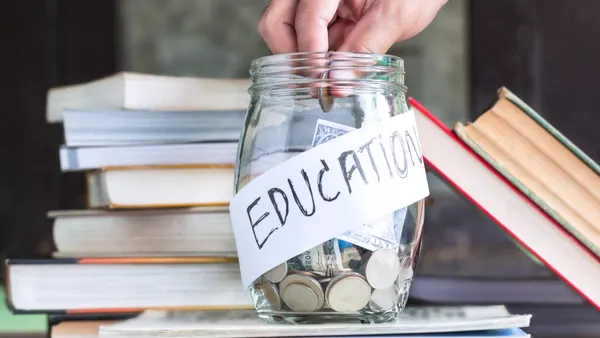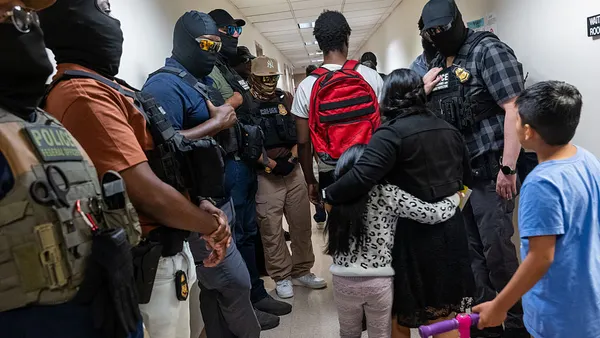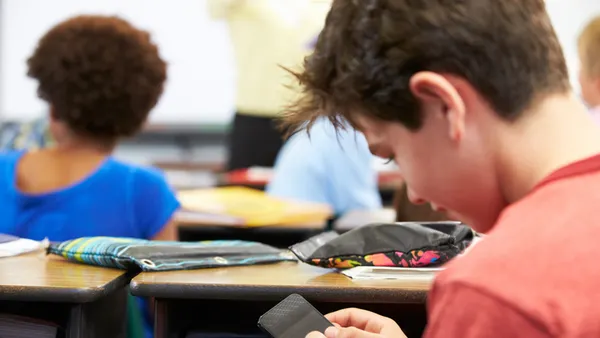This is the second installment of a two-part deep dive on the increased legal challenges districts face under the Individuals with Disabilities Education Act during the COVID-19 pandemic. For part one, click here.
When Mitchell Yell, a special education professor at the University of South Carolina, helped the South Carolina Department of Education craft guidance for serving students with disabilities during COVID-19, he wanted to make sure teachers and school administrators heard the important message that there was no wiggle room on the requirement to provide IEP-eligible students their guaranteed individualized services despite school closures or socially distanced learning formats.
So he recorded an hour-long explanation of the guidance that educators could listen to on repeat. “We wanted to tell them right away you still have to offer [a free, appropriate public education] to students with disabilities. It might look different, but you still have to do it,” Yell said.
Along with trying to support educators’ efforts to serve students during these unique circumstances and remain compliant with the Individuals with Disabilities Education Act, the effort was also meant to help schools avoid litigation for IDEA potential violations.
Parents of students with disabilities can directly sue a school district for failure to provide FAPE and potentially receive “compensatory education” when a district is found at fault for not providing services as outlined in a student's IEP.
A survey of states, published by The Center for Appropriate Dispute Resolution in Special Education, or CADRE, shows failure to implement a student’s IEP during the first six months of the pandemic was the most predominant issue for due process complaints.
Families have two years to file a due process complaint from when they knew or should have known about the alleged violation, though state policy may lengthen that timeframe. It’s a measure of legal recourse that concerns school leaders who say individualized special education services were provided to the best extent possible given the pandemic-related circumstances, such as school campus closures that were out of their control.
Where districts are at risk of legal challenges is when they cut or reduced services without parents’ agreement or failed to follow the procedural requirements of IDEA, said Jose Martín, an attorney with the Richards, Lindsay & Martín law firm in Austin, Texas, which represents school districts.
“Is everyone going to understand this is a pandemic and that the district is doing its best? Only if you can prove that,” Martín said.

Even during non-pandemic times, disputes can arise between parents and educators about the types and quantity of a student’s individualized services. According to data from CADRE — a U.S. Department of Education technical assistance center — special education litigation, known as due process, increased from 2008-2018.
The number of state complaints filed — another avenue parents and advocates have to voice special education grievances — had a minor increase in that 10-year span. Early dispute resolution approaches, such as voluntary mediation meetings, however, also increased from 2008-2018, showing parties’ willingness to resolve disputes without going to court.
“CADRE promotes early dispute resolution as much as appropriate,” said Melanie Reese, the center's director. “You want to address concerns as early as possible before they escalate.”
In some states, parents and school districts agree to invite an unbiased and trained facilitator to IEP meetings to help keep the dialogue focused on the student’s needs and move the conversation in a collaborative and respectful manner.
Proactive approaches
There are many examples of the measures school systems — and individual teachers — have taken to fulfill specific instructional approaches in students’ IEPs. For example, some schools that were fully virtual opened in-person learning opportunities only for students with disabilities who required intensive supports and other students who could not access learning online. Many schools provided extra tutoring times before or after school, used teletherapy services, or delivered assistive technology to students’ homes so they could better participate in online learning.
"You just can't say we've done enough. Keep trying. That's the mantra that I'm giving to all districts right now — let's keep trying."

David Bateman
Professor of special education law at Shippensburg University in Pennsylvania
Schools that are having more success in matching, or at least adapting, a student’s IEP from pre-COVID-19 to the current pandemic reality are taking several proactive measures, said special education experts.
For one, they are in constant communication with parents about how the student is accessing and engaging in learning, said Julie Weatherly, a special education attorney who represents school districts in Alabama, Georgia and Florida, and founder of Resolutions in Special Education.
“In light of the circumstances, work with parents to make sure they are informed — everything you've always done before — and working together to try as best we can to provide some appropriate services to children,” Weatherly said.
Matt Cohen, a Chicago-based attorney who represents families in special education disputes, agrees: “One of the most important positive characteristics of the guidance from the U.S. Department of Education and some states, to me, is that [schools are being told that they should be] engaging in a real dialogue and problem solving with the parents as partners, rather than just imposing a plan and expecting that the child and the parent will have to live with that whatever it is.”
David Bateman, who is a professor of special education law at Shippensburg University in Pennsylvania and who also works with districts to prepare them for due process hearings, said it’s not enough to just send emails and make phone calls. Follow-through should be comprehensive and include efforts to adjust practices if students are struggling and when parents have been unresponsive to outreach, he said.
“You just can't say we've done enough. Keep trying. That's the mantra that I'm giving to all districts right now — let's keep trying,” Bateman said. Those continuous efforts should also include verification a student can log into the virtual learning platform and has reliable internet, he said.
That’s the approach Auburn City Schools in Alabama is taking, said Director of Student Services Tim Havard. Although there are many challenges to adapting student services to virtual-only settings and even socially distanced in-person formats — particularly when supporting students with significant cognitive disabilities — Havard said the district, which serves about 1,000 students with IEPs, has not had a formal complaint during the pandemic.
Havard credits that to special education teachers being very responsive to parents’ questions and suggestions, saying educators need the support of parents as much as parents need the support of the district during this challenging time. “The key is to be attentive to students’ needs and communicate with parents,” Havard said.
CADRE’s Reese recommends schools not only follow IDEA’s requirements to provide parents notice of their due process and other procedural rights under IDEA, but to share CADRE’s parent resources on early dispute resolution practices and tips for virtual IEP meetings.
“Disagreements may arise and process errors are not unusual,” Reese said. ”The investment into building relationships helps increase trust. If a parent doesn’t feel trust, little problems may escalate as a result.”
Weatherly also advises school staff to have a system to thoroughly document efforts to communicate with families and modify approaches. While having a complete record of communication efforts and instruction adjustment decisions can help organize a school’s specific approach for individual students during this chaotic time, those records can also be used as evidence in a future court case, if necessary.
“We have drilled that into the heads of directors,” she said. “You do have to remember this is a different time. Your staff might be working from home on different networks and portals so you really do need to establish that system for documentation.”
"The investment into building relationships helps increase trust. If a parent doesn’t feel trust, little problems may escalate as a result.”

Melanie Reese
Director of The Center for Appropriate Dispute Resolution in Special Education
Several legal experts also warn districts against setting a blanket policy to provide compensatory services for all students with disabilities. While that effort may be well-intentioned, compensatory services are based on individual needs, and each student’s circumstance should be reviewed by the IEP team, Weatherly said.
“Cookie cutter approaches are dangerous,” she said. “There could be some IEP teams out there who can make individual decisions about what kind of impact they have seen that COVID is having on a child and go ahead and provide some, I prefer to refer to them as COVID impact services, or recovery services.”
But unresolved situations could develop into litigation against school districts, Weatherly said.
“I think we'll see a rash of them at some point, but I'm thinking that everyone's kind of flummoxed by how long this has been going on,” she said. “It's kind of hard for a parent attorney at this point in time to show what kind of compensatory education services ought to be provided when it's been almost impossible in many cases to assess the impact of COVID.”













